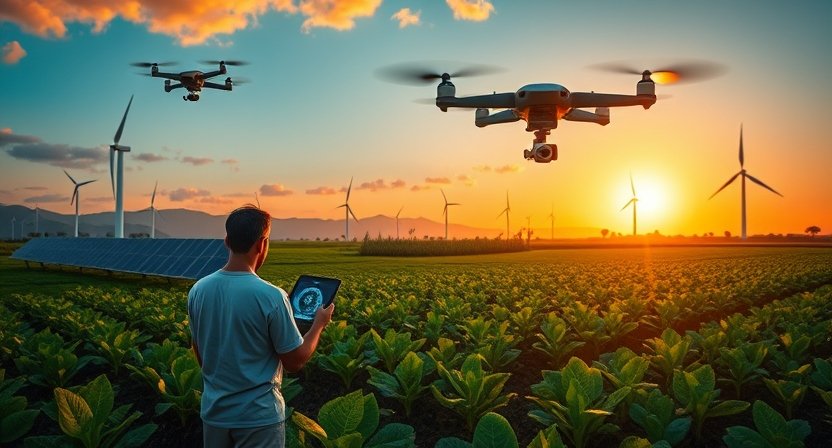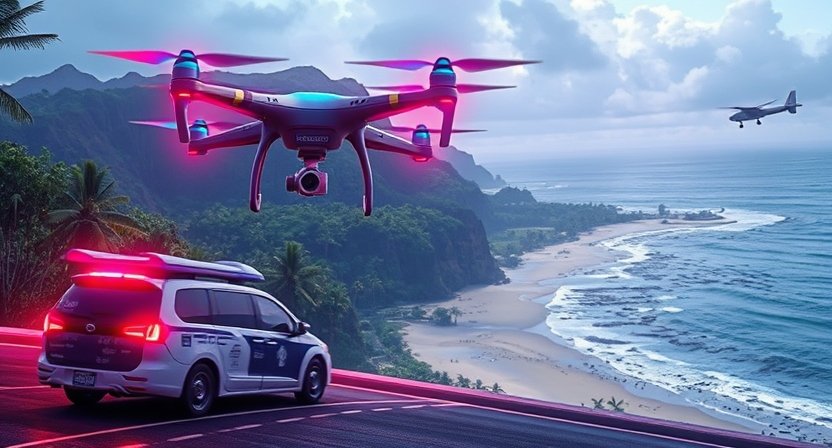Artificial Intelligence
Exploring Hawaii’s Emerging Artificial Intelligence Landscape

Artificial intelligence refers to communication between machines and has long ceased to be an idea for a distant future in movies. Globally, it is transforming sectors, updating companies, and solving multifaceted challenges. Even within Hawaii’s paradise-like surroundings, the AI wave has firmly arrived.
Although most people only equate Hawaii to beautiful shores, greenery and cultural aspect, few people are aware that Hawaii is one of the most promising technological development zones. This blog will analyze Hawaii’s current endeavors into the world of AI, the overall influence for the industry, possible hurdles, developments, and potential for the future, as well as how this new technology is changing the islands’ economy and society.
The Role of AI in Hawaii’s Business and Society:
AI gives Hawaii a chance to overcome geographical drawbacks and at the same time, foster innovation in several main fields, such as farming, tourism, medicine, and learning. Hawaii is one of the most isolated places in the world and it has many problems related to logistics and resources and AI is starting to assist.
- Sustainability Initiatives: AI in Agriculture involves farmers and enthusiasts of the natural resource by applying AI computer vision to monitor crops, minimize pest invasions, and control climate. This technology is essential in the production of food security as well as sustainability of the environment in the islands.
- Tourism Enhancement: Services of Artificial intelligence in hospitality include also chatbots, predictive analytics, and individual approach to tourists which is crucial for shaping the visits to the island.
- Healthcare Innovation: AI helps tech-driven identification of diseases, hospital resources management, and telemedicine to reach out to those in rural areas.
- Disaster Management: Autonomous intelligence has a critical role in providing heads-up on natural disasters like hurricanes or floods, making necessary evacuations, and getting resources to where they are needed to reduce the loss.
- Education Advancement: AI in education give individualized learning and experience, enhances student interaction and provides classroom experience for the students in remote areas that have physical barriers.
- Renewable Energy Optimization: Other applications of AI systems enhance the functionality of renewable power generation especially solar and wind energy so as to provide constant energy supply in development of sustainable energy practices.
- Transportation Efficiency: AI improves traffic flow and further the advancement of self-driving cars thereby; cutting the rate of fatalities, cutting carbon footprint and enhancing flow on the roads.
- Agricultural Enhancement: The innovations such as artificial intelligence yield better ways of tending to crops and control of pests and diseases, precision farming thus enhancing production.
- Disaster Prediction: Superior artificial intelligence algorithms identify patterns to find out probable natural disasters such as earthquakes and hurricanes and help to prepare adequately for the disasters and attend to them immediately.
- Cybersecurity Improvement: The AI enhances the ways to control cyber threats since it is capable of recognizing threats and securing information in real-time.

Current AI Initiatives and Companies in Hawaii:
AI is not a major focus in Hawaii despite not being in the heart of innovation like the valley, the AI community has been expanding through local and international partnerships and projects that involve both local business, educational institutions, and global companies.
University of Hawaii’s AI Research Initiatives:
The University of Hawaii (UH) is a driving force behind AI innovation on the islands. Their AI-focused research explores climate change modeling, disaster prediction for hurricanes and tsunamis, and marine ecosystem monitoring. UH’s efforts demonstrate the potential application of AI for Hawaii-specific problems.
Hawaiian AI Companies on the Rise:
Other startups such as Smart Yields are leveraging on machine learning technology to enhance farmers productivity in agriculture. Island-based tech companies also look into the use of AI in renewable energy management and self-driving delivery—a definitely useful solution in Hawaii, which relies heavily on logistics.
Collaborations with Global Players:
Hawaii has set its sights on AI, and now the islands serve as a proving ground for AI software developed by IBM, Nvidia and other tech titans with a focus on renewable energy and smart grids.
AI in Marine Conservation:
Hawaii is already using an artificial intelligence system to assist in the preservation of the oceans. By employing sophisticated mathematical models to measure sea temperatures, monitor sea life distribution, and analyze the condition of coral reefs, important information is collected to make valuable conclusions toward the preservation of the delicate environment. These innovations assist to retain the natural resources in Hawaii and to counter the significant problems of climate change.
Improving Healthcare Accessibility:
AI can provide better healthcare access to people in Hawaii especially to those in distant regions. Fog-based telemedicine solutions can include diagnostics and treatment advice that can help to eliminate the need to travel to large cities. Inequalities also mean that using Big data and AI to analyze health trends among the demography in Hawaii will enhance community health.
AI-Enhanced Disaster Preparedness:
The vulnerability of Hawaii to disasters likes hurricanes and tsunamis has meant that AI has been implemented in the prevention and management of disasters. Weather or any other patterns could be predicted and warnings could be given by the predictive models of analytics and drones also help in helping out during the phase of recovery. This leads to effectiveness and lower chances of the loss of human life.

AI Opportunities in Hawaii:
AI for Sustainable Tourism:
With AI tools helping detect overpopulated areas, Hawaii is capable of maintaining its natural wonder and delight for residents and tourists at the same time.
Presence of Educational Resources:
Companies based in Hawaii are benefiting from tech-savvy young talent produced by university education institutions such as the University of Hawaii and the Kamehameha Schools that produces a strong talent pool that has knowledge in data analysis, machine learning, and neural networks.
Investment in Renewable Energy:
AI provides opportunities to achieve Hawaii’s renewable energy targets by providing predictive analyses and energy optimization to advance the state’s goal to transition to 100% renewable energy by 2045.
Tourism Industry Advancements:
AI solutions are now being applied to the Hawaii tourism sector in order to improve experiences for visitors. AI-based, targeted recommendation systems, virtual travel agents, and intelligent booking systems are enhancing the travellers’ experience.
Support for Local Agriculture:
As an example of AI application in agriculture, Hawaii benefits from increased crop yield, and manages with issues like invasion of certain species or unfavourable conditions. The sensors and data analyses provided by AI help farmers to make reasonable decisions and use resources rationally.
Healthcare Innovations:
Incorporation of AI in healthcare in Hawaii is enhancing delivery of services and precision in diagnosis, care, and treatment of patients. This is especially treasured in the remote and rural areas because the wheel of the specialists’ reach is rather large.
Wildlife Conservation Efforts:
Hawaiian conservationists are using drone monitoring and pattern recognition software to track endangered species and defend the island’s distinctive ecosystems, thereby preserving its legacy.
Smart Infrastructure Development:
Hawaii is applying AI in the development of cities or infrastructures to make them intelligent. AI is making the development across the islands sustainable through traffic management systems and resource allocation.

AI Challenges in Hawaii:
Technology Cost:
AI utilization is capital-intensive, calls for infrastructure development and technical know-how – factors that could exclude small and local firms’.
Lack of Talent Retention:
Although Hawaii produces tech-educated students, its geographical isolation strongly implies that many of the professional-minded students move to the mainland to search higher paying jobs.
Digital Divide:
Hawaiian country areas face connectivity problems, which makes AI implementation with the focus on the internet and cloud integration problematic.
High Cost of Living:
This creates a problem for other tech professionals and startups to set base in the state due to high cost of living in Hawaii. This is because it becomes difficult to afford adequate human capital and training and to invest in new technologies, AI included.
Limited Research and Development Funding:
The state’s technology sector is known to experience problems with the availability of funding for innovation in AI technologies which is critical for the development of the industry. If investment cannot be made more substantial, the support of improvement paradigms proves to be challenging.
Geographical Isolation:
Finally, Hawaii faces challenges in organizational relationship and obtainment of resources due to its geographical position. This isolation can make partnerships with the larger tech centers difficult and reduce the level of access to new innovations in AI.
Regulatory Challenges:
Applying AI technologies in Hawaii may face various legal issues in certain sectors such as healthcare and tourism. Managing all these requirements can delay the use and advancement of AI solutions.
Cultural and Workforce Misalignment:
The integration of advanced AI is normally achieved when the workforce is knowledgeable in the use of sophisticated technology. Nevertheless, Hawaii’s old economy sectors like tourism, and agriculture can be culturally or skills-wise challenged for change to AI methods.
How AI is Transforming Hawaii’s Key Industries:
AI is proving its potential across critical Hawaiian industries, catalyzing innovation in both traditional and emerging sectors.
Agriculture:
Hawaiian agriculture is gradually shifting into an AI-based sector where drones check crop status and sensors forecast disturbances in climate. Other AI solutions include Smart Yields that may be used by farmers to predict the yields and better utilize, the available resources.
Tourism:
Tourism contributes 21 percent to Hawaii’s economy, and AI is used to enhance its operation. By using natural language processing in the conversation flow, chatbots suggest activities adjusted to travellers’ interests; while, on the other hand, the use of predictions minimize the problem of over-tourism by guiding tourists to less crowded places.
Healthcare:
AI solutions are meeting the needs that are currently unmet in the Hawaiian health care sector. Computers enhance diagnosis for instance through enlarged images, and artificial intelligent personal help reduce the health facilities’ accessibility challenges for patients in distant islands.
Renewable Energy:
Hawaii’s fuel costs are high and the rates of power outages still pose as problems, which makes AI invaluable for Hawaii. Therefore, to optimise the consumption in the households, the existing system is complemented with other sophisticated systems like grid optimization algorithms.
Education:
Current AI applications in Hawaiian schools work in the learner’s maps that allow teachers to address the needs of each learner effectively while raising the performance rates in learning—crucial in Course Hero rural learning institutions.
The Future of AI in Hawaii: Predictions and Projections
Looking ahead, Hawaii holds immense potential as a leader in sustainable AI innovation. By leveraging its unique environmental challenges, Hawaii could become a global showcase for AI applications that prioritize sustainability and resource efficiency. Key predictions include:
Wider Adoption of Renewable AI Solutions:
In turn, Hawaii can become an example for similar AI projects around the world, primarily in renewable energy and its implementation in organizational processes.
Growing Startup Ecosystem:
Specifically Hawaii has great potential for growth in tech startup, fuelled by investor focus on AI for tropical climate and isolated areas.
AI in Disaster Management:
Since Hawaii is vulnerable to hurricanes and tsunamis, AI will probably develop disaster forecast and crisis management services that will save thousands of people.
AI in Marine Conservation:
Hawaii’s diverse seas can be protected and monitored with the help of AI technologies. These technologies can monitor how the coral reef is doing, identify poaching, and simulate climate change effects on the sea life.
Smart Tourism Solutions:
The application of Artificial Intelligence in Hawaii can help the tourism sector control visitor distribution, adapt travel experience for the visitor, and reduce negative impacts on the environment by employing analysis on data and the most effective means of utilizing resources.
Agricultural Advancements with AI:
By applying AI, Hawaii’s agriculture industry can increase crop productivity, irrigate its fields more effectively and control pest species. It is also faster for machines learning algorithms to predict the right planting schedules and to study the condition of the soil.
AI-Powered Cultural Preservation:
Introducing AI as an assistant in education, learning about indigenous Hawaiian culture can be benefited from with the help of scanning textual historical sources, analyzing language patterns, and presenting historical information using VR.
AI in Renewable Energy Optimization:
AI can help Hawaii to achieve its challenging goal of transitioning to 100% clean power by 2045. AI in smart grids can address supply and demand fluctuations, enhance the storage of electricity, and incorporate multiple kinds of renewables effortlessly.
Why AI is Integral to Hawaii’s Tech Evolution:
Everybody in today’s world knows that Hawaii has natural beauty that cannot be compared to any other place, but the state has problems with geography that needs to be solved for the sustainable development and modernization. AI not only suggests an approach to solve these challenges but also allows the islands to become prosperous economically and socially using innovative solutions based on unique local cultural identity.
Are you interested in the future of AI in Hawaii? What do you think about the role AI will play in Hawaii’s growth? Please feel free to share your comments below and remember to share with anyone you think may find it useful!
-

 Artificial Intelligence8 months ago
Artificial Intelligence8 months agoWhat is Artificial Intelligence? A Comprehensive Guide for Businesses and Enthusiasts
-

 Artificial Intelligence6 months ago
Artificial Intelligence6 months agoHow to Use Grok AI: A Complete Guide
-

 Artificial Intelligence8 months ago
Artificial Intelligence8 months agoUnlocking the Power of Artificial Intelligence Tools
-

 Artificial Intelligence7 months ago
Artificial Intelligence7 months agoWhat is DeepSeek? Revolutionizing AI with Cutting-Edge Solutions
-

 Artificial Intelligence3 months ago
Artificial Intelligence3 months agoAI Technologies in Warehouse Automation:
-

 Artificial Intelligence4 months ago
Artificial Intelligence4 months agoMeta’s AI Push: The Standalone Assistant App Set to Rival ChatGPT
-

 Artificial Intelligence3 months ago
Artificial Intelligence3 months agoHow Artificial Intelligence is Revolutionizing Logistics:
-

 Artificial Intelligence3 months ago
Artificial Intelligence3 months agoPredictive Analytics for Demand Forecasting:


